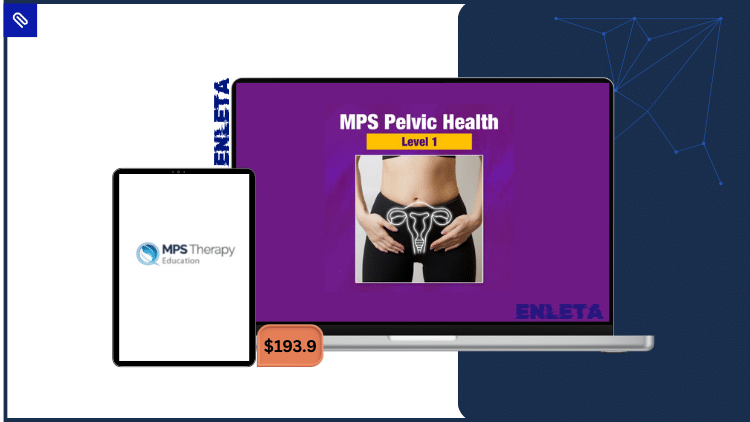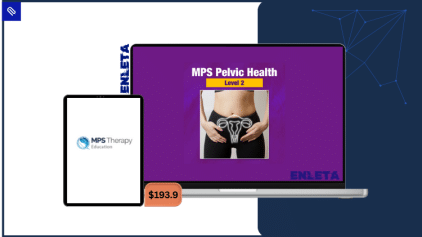MPS Pelvic Health – Level 1 by MPS Courses – Instant Download!
MPS Pelvic Health Level 1 Course offers an evidence-based, heart-centred approach to pelvic health that emphasizes the role of the autonomic nervous system (ANS) in restoring function and easing dysfunction. This training is created for clinicians, therapists, or allied health professionals interested in pelvic floor therapy, urinary, bowel or sexual health, or anyone wanting to understand how to support pelvic wellness with a nervous system-informed lens.
MPS Pelvic Health – Level 1 by MPS Courses Free Download – Includes Verified Content:
MPS Pelvic Health – Level 1 by MPS Courses – Free Download Video Sample:
MPS Pelvic Health – Level 1 by MPS Courses Free Download, Watch content proof here:
PDF Sample – MPS Pelvic Health – Level 1 by MPS Courses, watch here:
MPS Pelvic Health – Level 1 by MPS Courses – Overview of This Course
The course introduces participants to neurophysiological foundations, anatomy of the pelvic region, and how stress, trauma, or dysregulation of the nervous system can amplify pelvic floor dysfunction. Students engage in lectures, demonstrations, and guided practice to help integrate sensory awareness, breathing techniques, and regulation strategies. The “hands-on” (practical) element ensures that learners are not only exposed to theory, but also learn how to palpate, evaluate, and apply interventions appropriate to Level 1 scope.
Access to course materials, including anatomy visuals, case studies, and protocols for assessment and treatment, will support clinicians in applying what they learn directly in their clinical practice. By completing this course, learners will be equipped to support clients in improving urinary continence, reducing pelvic pain, restoring comfort in function, and enhancing quality of life.
Why Should You Choose This Course?
You should choose MPS Pelvic Health Level 1 Course if you are seeking long-term clinical outcomes such as “how to treat pelvic floor dysfunction using nervous system regulation” or “how to address chronic urinary or bowel issues with a trauma-informed pelvic health framework.”
Many pelvic health trainings focus purely on mechanics: strength, physical exercises, or manual therapy. What sets this course apart is its integration of the autonomic nervous system concept — recognizing that pelvic health is not only anatomical, but also deeply affected by nervous system state, stress, emotional regulation, and breath. If you want to treat clients more holistically — not just the muscles, but their nervous system environment — this course gives you tools for that.
Another reason is that Level 1 enables people with varying degrees of experience to begin safely with clinically appropriate interventions. If your aim is “how to serve clients with mild to moderate pelvic health issues” or “how to integrate pelvic pain or incontinence-care into your therapy toolbox”, this course gives foundational competence.
Additionally, for practitioners wanting to build confidence, credibility, and clinical skills, completing a structured Level 1 course shows commitment and competence. It allows you to offer pelvic health services informed by anatomy, neurology, and patient-centred regulation methods.
What You’ll Learn
By completing MPS Pelvic Health Level 1 Course, participants will develop a broad set of skills, integrating anatomy, nervous system work, and clinical interventions. Key learning outcomes include:
-
Anatomy of the Pelvic Region
Deep understanding of pelvic floor muscles, ligaments, fascia, innervation, pelvic organs; how anatomy influences function, posture, and mobility. -
Autonomic Nervous System Foundations
Learn how sympathetic and parasympathetic balance, stress response, trauma history, and breathing patterns affect pelvic floor tone, pain, and dysfunction. -
Sensory Awareness and Mind-Body Regulation
Techniques for helping clients sense their pelvic area, work with interoception, use breath and relaxation to reduce guarding, reduce hypertonicity, and alleviate discomfort. -
Assessment Protocols for Pelvic Dysfunction
How to screen for urinary incontinence, pelvic pain, bowel dysfunction; evaluate pelvic floor strength, flexibility, control, posture, and movement. -
Intervention Strategies
Safe, evidence-based Level 1 interventions: breathing retraining, gentle manual therapy, soft tissue mobilization, stretching, relaxation, exercises appropriate for early stage recovery. -
Client Education and Behavioural Modification
Teaching clients about toileting habits, bladder & bowel behaviour, movement modifications, ergonomics, stress management. -
Pain Modulation and Pain Science Insights
Introductory principles of how pain works, how the nervous system can amplify or reduce pain signals, using mindfulness, pacing, and gradual exposure to stimuli. -
Trauma-Informed Care Principles
How to create safe environments, use consent, respect client comfort, adapt intervention to sensitive histories, and avoid retraumatization. -
Practical Case Studies
Working through real examples: pelvic pain, postpartum pelvic floor weakness, urinary leakage, overactive bladder — what worked and how adjustments were made. -
Long-Term Maintenance and Relapse Prevention
Plans for clients to sustain gains: home-practice, self-care routines, strategies for when symptoms flare, monitoring progress, adapting over time.
Who Should Take This Course?
The MPS Pelvic Health Level 1 Course is appropriate for a range of practitioners and interested individuals:
-
Physical Therapists, Occupational Therapists, Physiotherapists who want to specialize or incorporate pelvic health and pelvic floor therapy in their practice.
-
Pelvic health clinicians working with clients experiencing incontinence, pelvic pain, or bowel dysfunction and want to deepen their understanding of regulating overactive pelvic floor.
-
Postpartum specialists and women’s health professionals supporting recovery after childbirth or surgery.
-
Wellness practitioners, massage therapists, bodyworkers who wish to understand pelvic anatomy and supportive interventions.
-
Students or recent graduates in rehab sciences wishing to build a strong foundation before advanced pelvic health courses.
-
Health professionals looking for LSI-related skills such as “nervous system regulation strategies for chronic pain”, “postpartum pelvic floor recovery protocols”, “emotionally informed pelvic health assessments”.
Conclusion
Pelvic health is complex—it involves anatomy, neuromuscular control, nervous system regulation, and lived-experience of clients. MPS Pelvic Health Level 1 Course offers a well-rounded, scientifically grounded, and empathic introduction to pelvic health therapy. By completing this course, you will gain long-term skills such as “how to assess and address pelvic floor dysfunction using regulation and anatomy together”, “how to support clients with urinary or bowel symptoms through nervous system modulation and behaviour change”, and “how to maintain pelvic health gains over time with safe, appropriate exercises and client education.”
👍Empower your clinical practice — enroll in MPS Pelvic Health Level 1 Course today and begin enabling deeper healing for clients through neurologically-informed, compassionate pelvic health therapy.
👉Next level is right here!











Reviews
There are no reviews yet.